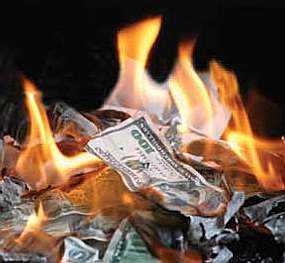 For Christians, where do our ideas on wealth and benevolence originate? Well, supposedly from the Bible.
For Christians, where do our ideas on wealth and benevolence originate? Well, supposedly from the Bible.
But we tend to look at the Bible as chunks of passages, some of which we like, some of which we tolerate, and some of which we ignore altogether. Even in the most dedicated Bibliophile, a tendency exists to proclaim fealty to every word of Scripture, yet the backtracking starts the second a few contentious verses come up.
Few passages are more problematic for people than those with money-related insights. Sometimes it seems as if no two churches preach the same basis for their perspectives on wealth and benevolence.
Readers of this blog, though, tended to fall in line on this topic. Critics would say that this is due to self-selection in the polling process, as these polls can’t possibly be a truly random sampling of American Christendom. Though I would tend to agree with that complaint, I also know we get a pretty broad readership here, more so than some other blogs that strictly cater to one specific type of Christian denomination or philosophy.
Despite whatever sampling problems these polls might have, let’s look at the theology readers bring to the issue.
A reminder of the Bible passages quoted for the first few questions:
Deuteronomy 28:13 – “And the LORD will make you the head and not the tail, and you shall only go up and not down, if you obey the commandments of the LORD your God, which I command you today, being careful to do them….”
Psalms 1:1-3 – Blessed is the man who walks not in the counsel of the wicked, nor stands in the way of sinners, nor sits in the seat of scoffers; but his delight is in the law of the LORD, and on his law he meditates day and night. He is like a tree planted by streams of water that yields its fruit in its season, and its leaf does not wither. In all that he does, he prospers.
Proverbs 21:13 – Whoever closes his ear to the cry of the poor will himself call out and not be answered.
Malachi 3:10 – “Bring the full tithe into the storehouse, that there may be food in my house. And thereby put me to the test, says the LORD of hosts, if I will not open the windows of heaven for you and pour down for you a blessing until there is no more need.”
Matthew 6:31-33 – “Therefore do not be anxious, saying, ‘What shall we eat?’ or ‘What shall we drink?’ or ‘What shall we wear?’ For the Gentiles seek after all these things, and your heavenly Father knows that you need them all. But seek first the kingdom of God and his righteousness, and all these things will be added to you.”
Mark 11:23-24 – “Truly, I say to you, whoever says to this mountain, ‘Be taken up and thrown into the sea,’ and does not doubt in his heart, but believes that what he says will come to pass, it will be done for him. Therefore I tell you, whatever you ask in prayer, believe that you have received it, and it will be yours.”
Luke 18:24-25 – Jesus, seeing that [the rich young ruler] had become sad, said, “How difficult it is for those who have wealth to enter the kingdom of God! For it is easier for a camel to go through the eye of a needle than for a rich person to enter the kingdom of God.”
Acts 2:44-45 – And all who believed were together and had all things in common. And they were selling their possessions and belongings and distributing the proceeds to all, as any had need.
2 Corinthians 9:6-7 – The point is this: whoever sows sparingly will also reap sparingly, and whoever sows bountifully will also reap bountifully. Each one must give as he has decided in his heart, not reluctantly or under compulsion, for God loves a cheerful giver.
1 Timothy 6:10 – For the love of money is a root of all kinds of evils. It is through this craving that some have wandered away from the faith and pierced themselves with many pangs.
[poll=27]
All I can say here is that I’m not surprised by the results. The top three verses are heavily used by churches when justifying their perspective on giving. My only surprise is that the Deuteronomy passage (“Head, not the tail”) was not supported more. That’s a very Pentecostal perspective and I know a respectable number of Pentecostals read this blog.
Then again, the number of people taking these polls dropped by half by the time this poll ran, so perhaps some readers just got fed up with a week of polling!
[poll=26]
I found these responses to be interesting because it shows that readers are more aggressive and less structured in their giving than what their churches preach. The Malachi passage (“10 percent”) dropped here and the Acts passage (“Selling possessions and sharing wealth’) moved up. I think that’s a good thing. Considering how often I talk about going “all in” on this blog, I’m not surprised that readers tended to agree.
[poll=28]
I once blogged that the Mark passage (“Believe and it will be yours”) is the least-believed verse in the Bible, and eerily enough, you readers verified that my assessment may not be off the mark. (“Off the mark“—Ha! a pun!) The Acts passage, though more readers agreed that it was close to what they believed, was also hard for some to handle.
The Mark passage is tough, but I know I personally struggle even harder with the Psalms passage (“In all that he does, he prospers”) in my own life. I know a lot of good people who are struggling, some asking when that promised prosperity is going to show. That’s a tough call. I think of myself as a Psalm 1 kind of guy, but certainly not everything I’ve done prospers. Still trying to process that one in my own life. I guess a few others struggle with it, too.
[poll=29]
Interestingly, my previous unpacking of the poll on tithing had a lot of people agreeing with me in the comments that the temple tithing system had been completed in Jesus and was no longer binding, but a quick look here shows that a third of you disagreed. I’m wondering why the dissenters didn’t comment then on my follow-up post on tithing. Dissenters?
[poll=30]
Well, we’re on the same page regarding consumerism, that’s for sure. Same goes for neglecting the poor. Thanks for those answers. Fewer picked the prosperity gospel as a threat, but guess what? That’s what the second part of this analysis will address, seeing that a few other blogs have talked about prosperity teachings lately and their insidious effects on the American Church today.
But back to consumerism. It’s a form of idolatry, isn’t it? We’ve found a way to fill that classic “God-shaped hole” with whatever the hot new item at Apple or Target may be. Heck, don’t we all know at least one person who has purchased every incarnation of the iPod since the day of its first release? The gal who’s on her fourth digital camera? The guy who’s 30 and yet has owned six different computers in his life? Buy and discard. Lather, rinse, repeat.
And yet that consuming ideal has not only run our country into the ground in our quest for more cheap stuff that rusts and decays, but has been elevated to satisfy the ennui of the soul—if only from one great buy to the next.
Worse, our entire economy is geared to a frenzy of buying. When people finally wise up and scale back, it only damages our economy more, based as it is on a house of cards. Pull out a couple cards and the whole thing collapses. Or so it seems from the newspaper headlines. But I’ll talk about that in a few days, so hold on.
[poll=31]
Ah, Ben Franklin’s classic aphorism. Considered by some to be in the Bible. The “God can’t steer a parked car” passage.
Most of you said that was false, but almost a third said they either weren’t sure or thought ol’ Ben was right on target. I want to thank those of you who answered “True” or “Unknown” for your honesty. I think people struggle with this idea immensely. Everything in American culture tells us to pull ourselves up by our own bootstraps and grab for the gusto.
And while it may seem like that indeed works for a lot of people (I’m thinking Oprah. here), I’ve got to wonder if it’s the arm of flesh rather than the arm of the Lord. Waiting on God to work is a foreign concept to most of us. We want things in our time done our way (because if we want something done right, we have to do it ourselves). But I just can’t find that way of thinking in the Bible.
I’m willing to be corrected, though. If someone would please, and I mean this seriously, sketch out the Biblical support for “God helps those who help themselves,” I’ll be willing to listen and discuss it here. Because as that great theologian Tom Petty once wrote, “The waiting is the hardest part.”
[poll=32]
The Bible most definitely teaches that God is the one who makes a person rich or poor. A verse that comes to mind:
The LORD makes poor and makes rich; he brings low and he exalts.
—1 Samuel 2:7
And this is an interesting concept since God also commands us in hundreds of passages to take care of the poor. In fact, when we ignore the poor, it angers Him.
So what is going on here?
In the case of the Church, I believe that God makes rich and poor to reveal His glory. And He wishes to reveal that glory by using the Church. It is in the Church’s best interest to partner with God to raise the poor up so that they are rich. I think of the state of widows and orphans, two classes of people dear to God’s heart, and the impact the Church in Jerusalem had on their lives. They went from poor outcasts to having families, food, clothing, and shelter. If that’s not being raised up, I don’t know what is.
This goes hand in hand with Jesus’s response about a certain blind man:
And his disciples asked him, “Rabbi, who sinned, this man or his parents, that he was born blind?” Jesus answered, “It was not that this man sinned, or his parents, but that the works of God might be displayed in him. We must work the works of him who sent me while it is day; night is coming, when no one can work. As long as I am in the world, I am the light of the world.”
—John 9:2-5
Yes, God is in control. But He also wants us to bring things into alignment with His Kingdom. He may indeed bring a good man low, but He also charges the Church with raising that good man up again for His glory.
Too many of us are willing to sit back and do nothing, believing that what is exists because God has made it that way. And that may be true. However, is that state meant to be permanent? The rest of Scripture most definitely shows that God wants those who follow Him to act, to help change the person of lowly estate into one of abundance and riches. We have to understand this! God is glorified when the Church takes a bad situation and corrects it. In fact, God may have provided that bad situation as a learning tool for us. To make us work to bring light into darkness.
May we never be content with someone else’s suffering.
As that 1st Samuel passage concludes:
He raises up the poor from the dust; he lifts the needy from the ash heap to make them sit with princes and inherit a seat of honor. For the pillars of the earth are the LORD’s, and on them he has set the world.
—1 Samuel 2:8
And guess what? He uses us to accomplish that purpose!
[poll=33]
Your answers surprised me. A couple years back, I asked how many of you were taught to cast your bread upon the waters, so to speak, and most agreed. In other words, when you give, you get in return. Yet here very few said your church taught that idea of the multiplication of giving. Very intriguing. I’m not sure how to think about this.
The KJV has this:
I had fainted, unless I had believed to see the goodness of the LORD in the land of the living.
—Psalms 27:13
Do we believe that we will see the goodness of the Lord in the land of the living? Or will we have to wait to see it after we die? Most of you thought the latter.
I’d love to get some feedback from all sides on this particular answer. Why did you answer as you did?
[poll=34]
This last question showed that half of you thought your work impacted your walk with Christ positively. I believe that God blesses our work, so that’s good. Yet a little more than 1 in 6 of you thought it worked against your growth.
I would love to hear feedback from both sides of this answer. Why did you answer as you did?
So ends my first comments on the theology behind wealth and giving. My next post, as I mentioned, will look at prosperity gospel teachings and whether they are good or bad for the Church in America. My answers may surprise you, so stay tuned!
***
Banking On God: Series Compendium
 In the last couple days, I’ve looked at some problems the Church in America faces in addressing financial crises. I’ve also dissected your poll responses on this issue, too.
In the last couple days, I’ve looked at some problems the Church in America faces in addressing financial crises. I’ve also dissected your poll responses on this issue, too.
 That I’m still under the weather makes today’s post all the more apt. Feeling lousy may be a state many of us will better understand in the days ahead.
That I’m still under the weather makes today’s post all the more apt. Feeling lousy may be a state many of us will better understand in the days ahead. For Christians, where do our ideas on wealth and benevolence originate? Well, supposedly from the Bible.
For Christians, where do our ideas on wealth and benevolence originate? Well, supposedly from the Bible.